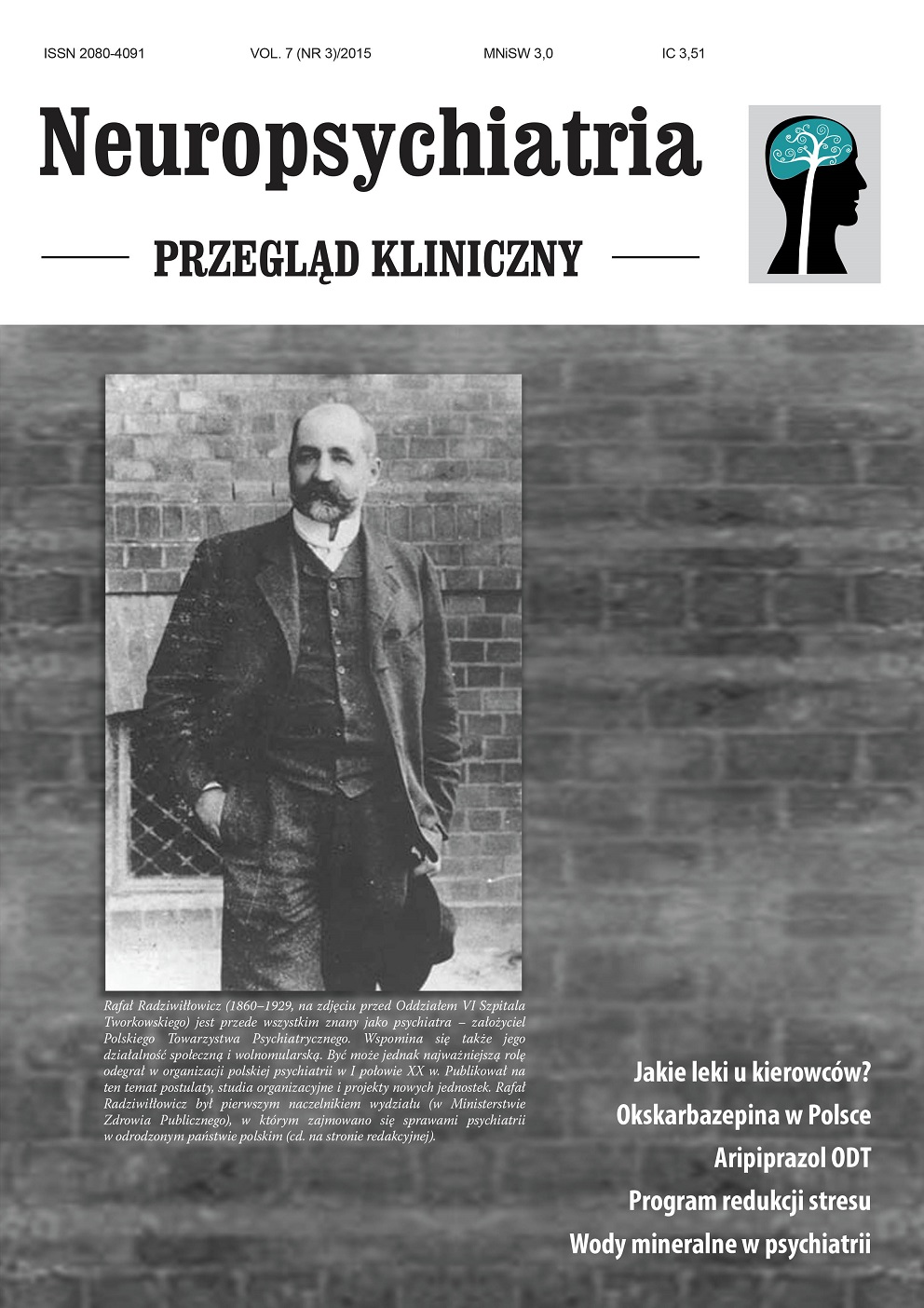Civilization syndrome. New diagnosis and new therapeutic approach Review article
Main Article Content
Abstract
Although the relationship between the content of stress and serious diseases, such as depression, is not obvious, underlying mechanisms encourage more and more authors to define a civilization syndrome as a link between our modern lifestyle, civilization we live in and psychosomatic disorders. With regard to the civilization syndrome, there are several new ”candidates” waiting for psychiatric research, like burnout syndrome, infertility or solitude. All these phenomena seem to increase epidemically and require urgent conceptual and therapeutic studies.
Using the new stress reduction program, innovative psychotherapeutic approach, engaging also several lifestyle factors, like physiotherapy, nutrition aspects, behavioral coaching, communication and social media contact and multimedia monitoring, most of patients improved in terms of emotional and behavioral markers, in short-, medium-, and long-term follow-up observations. This program interplays between stress and mental health problems and opens up new possibilities for diagnosis and therapy, focusing on the challenges of civilization, and especially opens up preventive options in stress-related diseases, which represent a growing health problem in the modern society.
Article Details

This work is licensed under a Creative Commons Attribution-NonCommercial-NoDerivatives 4.0 International License.
Copyright: © Medical Education sp. z o.o. License allowing third parties to copy and redistribute the material in any medium or format and to remix, transform, and build upon the material, provided the original work is properly cited and states its license.
Address reprint requests to: Medical Education, Marcin Kuźma (marcin.kuzma@mededu.pl)
References
2. Björntorp P. Visceral obesity: a “civilization syndrome”. Obes Res 1993; 1(3): 206-222.
3. Simon K. Civilization stress, cardiovascular risk, evidence-based medicine, guidelines. Orv Hetil 2009; 150(19): 895-902.
4. Łoza B, Parnowski T (red). Nowa depresja. Nowe leczenie. Medical Education; Warszawa 2013. Wydanie II zmienione.
5. Łoza B. Rozdział 44: Depresja u osób z zespołem metabolicznym i cukrzycą. W: Artur Mamcarz: Zespół Metaboliczny. Medical Education, Warszawa 2008, Wydanie II rozszerzone: 529-544.
6. Marquié JC, Tucker P, Folkard S et al. Chronic effects of shift work on cognition: findings from the VISAT longitudinal study. J Occup Environ Med 2014; 72(4). https://doi.org/10.1136/oemed-2013-101993.
7. Stoyanova R, Harizanova S. Economic losses caused by burnout syndrome among prison personnel in Bulgaria. International Journal of Health Economics 2013; 3.
8. Maske UE, Riedel-Heller SG, Seiffert I et al. Prevalence and Comorbidity of Self-Reported Diagnosis of Burnout Syndrome in the General Population. Psychiatr Prax 2015.
9. Bank Światowy. Polska: tempo wzrostu liczby ludności. 1960-2013. Wersja: 29.07.2015.
10. Harvard Health Publications. The psychological impact of infertility and its treatment. 01.05.2009. Wersja: 30.07.2015.
11. House A. Stress reduction program for infertility. MCG Women’s Behavioral Health Program, Georgia Regents University, Augusta. Wersja: 29.07.2015.
12. Boivin J, Schmidt L. Infertility-related stress in men and women predicts treatment outcome 1 year later. Fertility and Sterility 2005; 83(6).
13. Henderson T. More Americans living alone, census says. The Washington Post, 28.09.2014. Wersja: 30.06.2015 .
14. Raphael TJ. Singles now outnumber married people in America. Lifestyle & Belief, 14.09.2014. Wersja: 30.07.2015.
15. GUS. Stan zdrowia ludności w 2009 r. Raport GUS. ISBN 978- 83-7027-468-9.
16. Maslach C, Jackson SE, Leiter MP. MBI: The Maslach Burnout Inventory: Manual. Palo Alto: Consulting Psychologists Press, 1996.
17. Kristensen TS, Borritz, M, Villadsen, E, Christensen KB. The Copenhagen Burnout Inventory: A new tool for the assessment of burnout. Work & Stress 2005; 19: 192-207.
18. Moura-Ramos M, Gameiro S, Canavarro MC, Soares I. Assessing infertility stress: re-examining the factor structure of the Fertility Problem Inventory. Human Reproduction 2012; 27(2): 496-505.
19. Russell D. The UCLA Loneliness Scale (Version 3): Reliability, validity, and factor structure. Journal of Personality Assessment 1996; 66: 20-40.
20. Cohen S, Kamarck T, Mermelstein R. A global measure of perceived stress. J Health Soc Behav 1983; 24: 386-396.
21. Łoza B, Polikowska M, Reszczyńska M. Suplementacyjna terapia mineralną wodą siarczkową u osób z zaburzeniami emocji. Neuropsychiatria 2015; 7(2).

